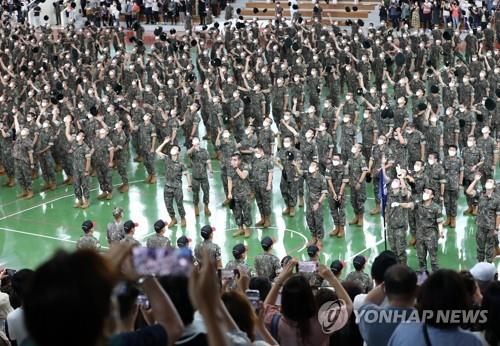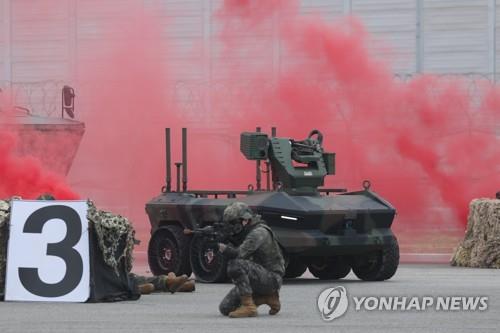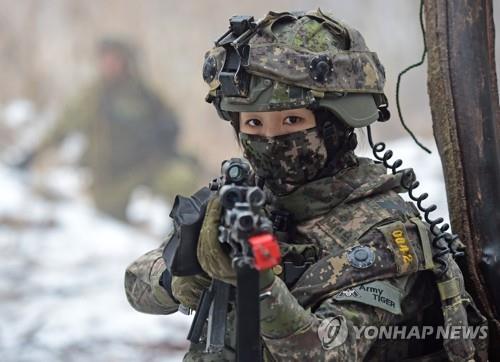
New conscripts attend a basic military training graduation ceremony held at the Korea Army Training Center in Nonsan, 152 kilometers south of Seoul, in this file photo taken June 29, 2022. (Yonhap)
Posted on 04/23/2024 8:33:56 PM PDT by SeekAndFind
South Korea's shrinking pool of conscripts is causing concerns amid the growing threat from North Korea, prompting the military to mull options to effectively maintain combat readiness with limited resources.
In South Korea, all able-bodied men must serve mandatory military service for at least 18 months, while women can volunteer for military duty as officers or non-commissioned officers.
The number of military personnel has been on a steady decline over the past decades due to the country's persistently low birth rate, falling below 500,000 for the first time last year.
South Korea's total fertility rate-- the number of children that are expected to be born to a woman over her lifetime -- hit a record low of 0.78 last year, according to Statistics Korea. In contrast, North Korea's comparable figure was 1.8 in 2023, according to the U.N. Population Fund.

New conscripts attend a basic military training graduation ceremony held at the Korea Army Training Center in Nonsan, 152 kilometers south of Seoul, in this file photo taken June 29, 2022. (Yonhap)
Experts suggest the declining birth rate could erode the country's military recruitment capabilities, potentially impacting its defense posture against North Korea, which currently maintains more than 1.2 million active soldiers.
"If South Korea maintains the current system, the number of military personnel is expected to stay around 470,000 on average in the next 10 years," Cho Kwang-ho, a senior researcher at the state-run Korea Institute for Defense Analyses, said in a report.
To adapt to this demographic shift, the Army, the largest branch of the armed forces, has been exploring various ways to effectively enhance its military capabilities, including deploying cutting-edge technology in combat system and scaling down the ratio of non-combat positions.
The Army has outlined plans to modernize its combat system and last year established the TIGER Demonstration Brigade equipped with advanced weapons systems, artificial intelligence-powered drones, high-tech combat gear and armored fighting vehicles.
"I'd like to focus on people, the key to the military's combat capabilities and the most important asset," Army Chief Gen. Park An-soo said during a forum last week. "We have to tackle the challenge of declining recruitment by transforming the Army into a technology-based combat force."
Recently, three divisions on the western front under the Army's 1st Corps decided to disband their recruit training divisions and assign them to other units, seen as efforts to deal with the diminishing pool of conscripts. 
A multi-purpose unmanned fighting vehicle maneuvers during a press event held by the Army's TIGER Demonstration Brigade, a trial unit armed with cutting-edge weapons systems, at an aviation unit of the Army in Yangju, north of Seoul, in this file photo taken June 2, 2023. (Yonhap)
Projections of decreasing military manpower have sparked debates about whether women should be conscripted, but the defense ministry has denied weighing the option, which could set off hotly contested debates.
Instead, the focus has been on increasing the recruitment of women in the military as a feasible alternative.
The ratio of female soldiers in the military has steadily risen from 6.2 percent in 2018 to 9 percent last year. The military aims to increase their proportion to 15.3 percent of the total by 2027.
In October, the Army initiated a study on ways to increase the recruitment of female volunteers to compensate for the shortage in fighting-age men.
"Given the sharp fall in the number of young males, the Army needs to consider various measures to address the personnel shortage, including the expansion of female military personnel," the Army said.
The number of 20-year-old South Korean males, which totaled 333,000 in 2020, is expected to fall to 226,000 in 2025 and 143,000 in 2040, according to an official estimate.

A female soldier of the TIGER Demonstration Brigade attends a field training exercise held in Paju, about 40 kilometers northwest of Seoul, in this file photo taken Jan. 14, 2023. (Pool photo) (Yonhap)
In the short term, the Military Manpower Administration (MMA) is reviewing the supplementary military system, widely perceived as providing exemption from conscription for elite athletes and classical musicians.
Under this system, elite athletes and classical musicians are required to undergo basic military training for just three weeks before engaging in activities within their respective professional domains for 34 months, while also fulfilling volunteer work obligations.
South Korea introduced the supplementary military system in 1973 to promote national prestige. This benefit is extended to young males who clinch gold medals at international sports events, including the Olympics and Asian Games, as well as classical musicians who win top prizes at prestigious competitions.
Still, members of K-pop supergroup BTS are not eligible for the supplementary military system. Four members of the group -- RM, V, Jimin and Jungkook -- are set to join the Army as active-duty soldiers early next week. Three other BTS members -- Jin, J-Hope and Suga -- have been serving in the military.
"Given the purpose of the creation of the current supplementary military system in sport and art, people may have questions about whether the current system is serving its original purpose," MMA Commissioner Lee Ki-sik said during a parliamentary audit in October.
"(MMA) will give a comprehensive assessment of the supplementary military service system to decide which areas need to be retained, removed or reduced in order to operate it in line with its original purpose," he added.
” South Korea’s total fertility rate— the number of children that are expected to be born to a woman over her lifetime — hit a record low of 0.78 last year, according to Statistics Korea. In contrast, North Korea’s comparable figure was 1.8 ...”
If North Korea ends up winning due to the South aging out and emptying out, it will be the ultimate expression of the idea that “the future belongs to those that show up”.
No matter how tyrannized or decrepit.
North Korean babies are underweight and suffer mental retardation due to malnourishmrnt.
I know.
But even malnourished retards will occupy South Korea if it is empty.
Same thing is going to happen here unless they change the divorce laws.
In the formerly White countries of the West, the replacements are being imported.
Reducing the White birthrate as much as possible is a feature, not a bug.
While North Korea is certainly no paradise, life in South Korea, if you are middle-class is so hypercompetitive and soul-less and stressful, it’s a wonder why anyone there has time to have any babies at all.
Your entire childhood is spent in cramming and extra tuition classes to get into a good university. Your job means you will be working 18 hrs a day until you are 65. Housing is near unaffordable.
Disclaimer: Opinions posted on Free Republic are those of the individual posters and do not necessarily represent the opinion of Free Republic or its management. All materials posted herein are protected by copyright law and the exemption for fair use of copyrighted works.